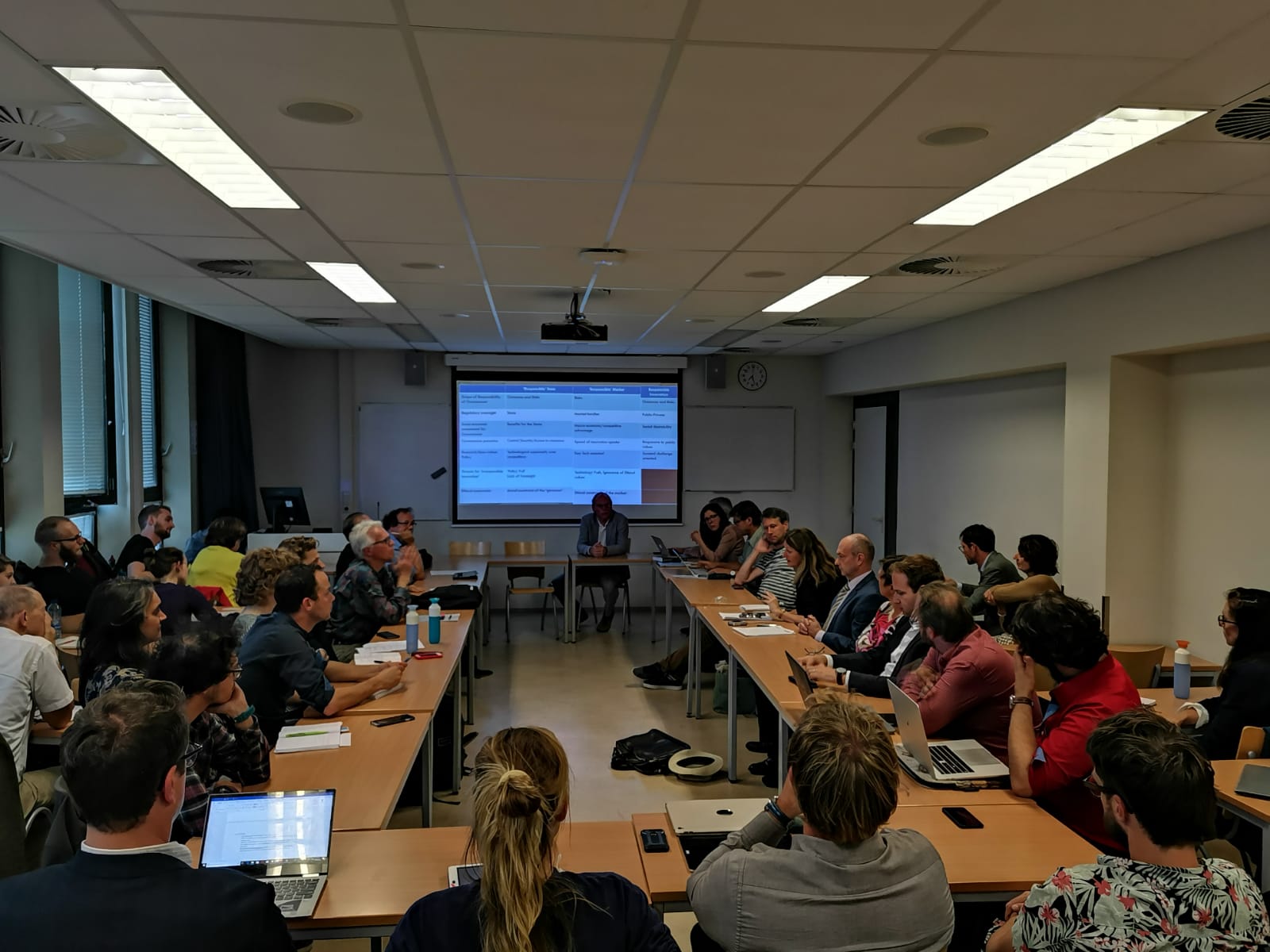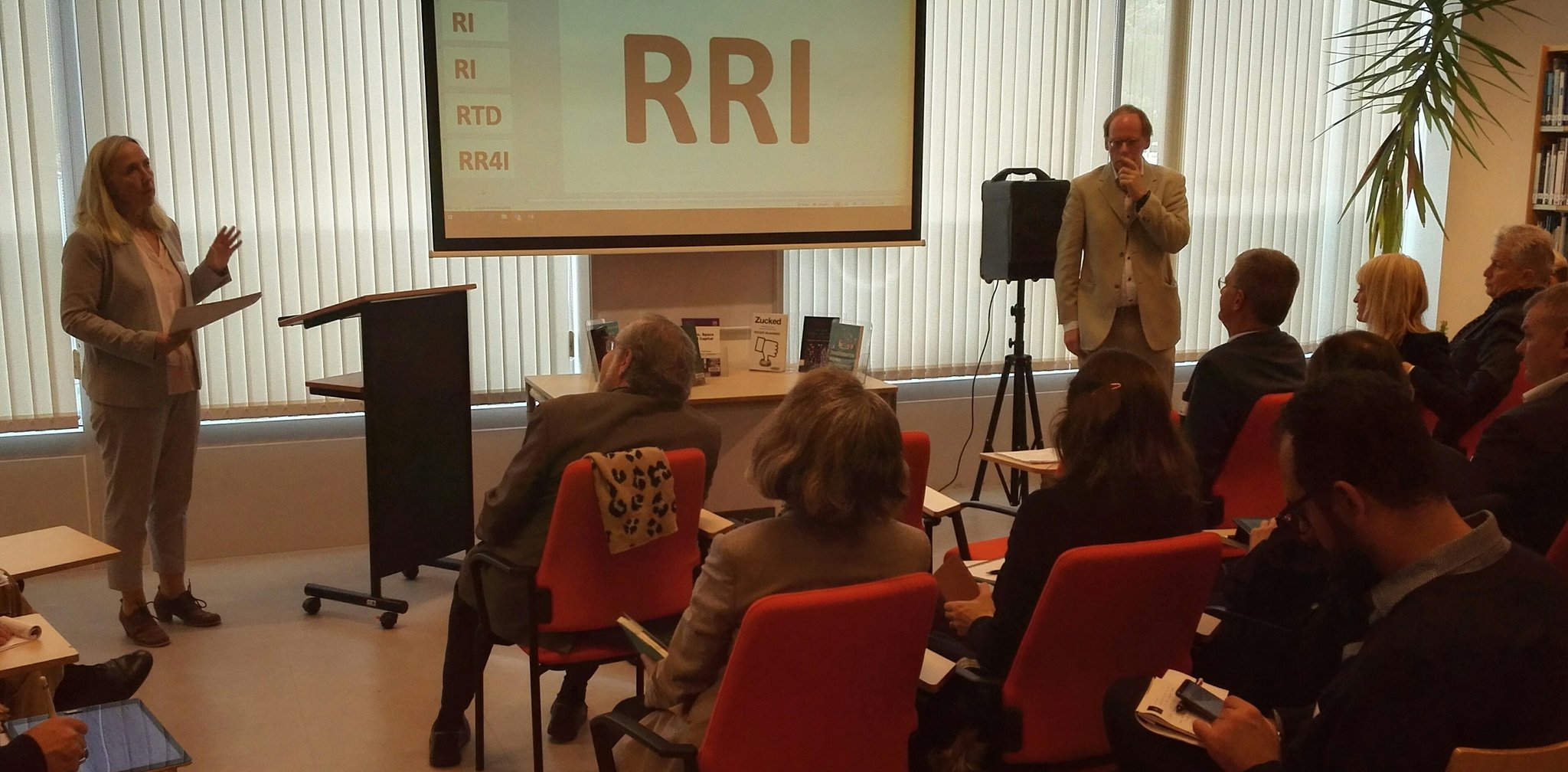On the occasion of the book launch of the International Handbook on Responsible Innovation. A global Resource, a series of international events took place to discuss the challenges ahead of us for the further development and implementation of responsible innovation. Below you will find the agenda’s and summaries and higlights of the discussions in chronological order. The events took place in Leiden(NL), London, Brussels, Manchester and Milan.
CHALLENGES FOR RESPONSIBLE INNOVATION: LEIDEN
12 September 2019-18:00-20:00- Leiden University
Faculty of Social and Behavioural Sciences, Pieter de la Courtgebouw , ROOM 1A01(First floor),Wassenaarseweg 52 2333 AK Leiden, The Netherlands
Introduction: Dr. René von Schomberg ki
Panel discussion on Challenges for Responsible Innovation
- Prof. dr. Ibo van der Poel,Technical University of Delft
- Prof. dr. Harro van Lente, Maastricht University
- Dr. Melanie Peters, Director Rathenau Institute, The Hague, The Netherlands
- Prof. dr. Jacqueline Broerse, Free University of Amsterdam
- Prof. dr. Paul Wouters, University of Leiden
- Prof. dr. Sarah de Rijcke, University of Leiden
- Dr. Vincent Blok, Wageningen University
- Dr. Dirk Stemerding.
Discussion with audience and panel

CHALLENGES FOR RESPONSIBLE INNOVATION: LONDON
19 September 2019, 18:00-20:00- University College London- David Davies Lecture Theatre, Roberts Building G08/engineering building, Torrington place
Introduction: Dr. René von Schomberg
1. Dr.Stevienna de Saille, Sheffield University
2. Prof. Andrew Stirling, Sussex University
3. Prof. Bernd Carsten Stahl, De Montfort University
4. Dr. Jack Stilgoe, UCL London
5. Dr. Melanie Smallman, UCL London
6. Prof Marina Jirotka, Oxford
Discussion with audience and panel
Highlights of the Leiden and London discussion https://app.box.com/s/z1uzybq083u1c3bs18iun7wi5r019maq
CHALLENGES FOR RESPONSIBLE INNOVATION: BRUSSELS
3 October 2019-DG Research and Innovation, RTD Library
Square Frère-Orban 8- Brussels
Programme
11.00- 11.15 Welcome Address by Director-General Jean-Eric Paquet- Value-Driven Research and Innovation
11.15- 11.45 Guest speaker: Prof. dr. Alfred Nordmann- Technical University Darmstadt
The Ties that Bind- Collective Experimentation and Participatory Design as Paradigms for Responsible Innovation
11.45- 12.15 Discussion with Prof. dr. Alfred Nordmann
12.15-12. 30 Introduction. Why responsible Innovation? Dr.Dr.phil René von Schomberg
12.30- 13.30 Panel discussion on Challenges for Responsible Innovation
- Robert Madelin, FIPRA- Public Affairs Consultancy, and former senior advisor on Innovation, Director-General of CONNECT/SANCO
- Prof. Dr. André Martinuzzi Head of the Institute for Managing Sustainability Associate Professor at WU Vienna Vienna University of Economics and Business Reponsible Innovation: The challenges for Industry
- Prof. Alexander Gerber-, Science Communication- Rhine-Waal University, Germany Responsible Innovation: Challenges for Science Communication
- Prof. Ellen-Marie Forsberg- Managing Director Østfoldforskning, Norway: Challenges for Research Practices
- Olga Wessels: European Consortium of Innovative Universities (ECIU) ECIU is determined to change the way of delivering education from degree-based to challenge-based: Responsible Innovation: Co-creation with industry, public organisations, society and academics
- Kurt Vandenberghe, Director- DG Research and Innovation
13.30-14.00- Discussion with audience& panel
HIGHLIGHTS OF THE DISCUSSION IN BRUSSELS: https://app.box.com/s/qqrrgew1ylnmlebdwnsity7jif95rjik

Challenges for Responsible Innovation: Events in Manchester (27 November 2019) and Milan (23 January 2020)
Overview, summaries and video’s of the Challenges event at Manchester Metropolotan University and in Milan at the Bassetti foundation can be found here:
In order to become a community of responsible scientists and innovators, our community should take several actions.
a) First of all, scientists (and especially the so-called ‘hard’scientists and innovators) should be aware and openly admit that they are thoroughly political actors, in the sense that they create and introduce on the markets—without democratic legitimation- the applications that create the conditions of private and public life.
b) The R&I community should take in public a clear stance regarding a devastating economic system that on the one hand results in growing inequality – inter and intra country (see the comment of David Kaplan) – and on the other hand is heading to destroy the preconditions for living a humane life. Growing inequality does not only limit market-based inclusive innovations. It also minimalizes the preparedness of citizens to take steps to fundamentally transform destructive systems.
c) Economic scientists have a heavy responsibility to redesign the economic system so that the freedom of the market smoothly results in fair distributions of income/power and of chances for personal development. The freedom of the market is not a natural phenomenon, it is created by legal (e.g. property regimes) and other (e.g. cultural norms and values) institutions. This freedom can thus be (re)constructed as a result of political action! The ambition of a redesigned economic system should be in first instance to raise well-being. Therefore, both economic, social and human scientists need to investigate what levels and types of welfare are a necessary, but not a sufficient condition.
d) Our world is nowadays an – at least economically- globalized world. Therefore the R&I community should consider not only local, but also global impacts of their work.
e) The community of scientists should publicly and loudly support the brave initiatives of Greta Thunberg and her young allies, who raise their voice and beg politicians and adults to secure the conditions that will enable them to live in human dignity. It is sad to see how some members of the scientific and political community and of public and social media are humiliating them by treating them as if they were ignorant, uninformed, alarmist children.
LikeLiked by 1 person
Suggestion for discussion: what specific challenges arise for the theory and practice of RRI when the focus of societal concern falls, not on single emerging technologies or on specific sets/sites of scientific practices, but on the planned evolution of socio-technical systems (such as the decarbonisation of the energy system)? How can RRI contribute to the shaping of such transitions?
LikeLiked by 2 people
I wish to submit two questions for reflection in the upcoming responsible innovation meetings in 2019.
• The concerns for and interest in responsible innovation reach far back in history. As noted in a recent review (1) of the International Handbook on Responsible Innovation (2) “When Plato (more exactly, Juvenal) asked who guards the guardians, he was questioning whether any group can be trusted to look past its own interests for the common good. This has become a pressing question concerning the scientific community’s relation to society.” (Frodeman, 2019).
In a time of post-truth and global populism, it is worth expanding the above age old question “Who will guard the guardians?” beyond scientists to actors involved in technology regulation and governance as well.
That is, who will guard the guardians, be they scientists or technology regulators?
• The old ways of technology governance and regulation are dead but the new cannot be born, not just yet. In this ‘interregnum’, it is perhaps the right time to contemplate new unprecedented institutions for critical governance of science and society. Emphasis on ‘critical governance’ as opposed to governance, cannot be over-emphasized and very much needed in current times.
How can we create and sustain such new critically-informed institutions for technology governance?
With thanks and best wishes,
Vural Özdemir
Senior Medical Editor and Advisor
Technology Governance and Responsible Innovation
Toronto, Canada
Twitter: @Criticalpolicy1
(1) Frodeman R. (2019). Review of International Handbook on Responsible Innovation. A Global Resource. Journal of Responsible Innovation 6(2), 255–257.
(2) Von Schomberg R. and Hankins J. (2019) International Handbook on Responsible Innovation. A Global Resource. Cheltenham and Northampton: Edward Elgar publishing.
LikeLiked by 2 people
Some of the main challenges that responsible innovation understood in RRI terms must confront could be: (i) the risk of “fetishizing” the normative framework of RRI (i.e., those values that are assumed to define and indicate the ´right impacts´ of technological innovations under the EU), (ii) the (relative) lack of operational mechanisms to promote inclusivity and participation in research and innovation dynamics, and (iii) the need for a stronger recognition of the conflictual nature of the relation between RRI-like initiatives and the dynamics and imperatives characteristic of highly competitive innovation systems such as the European one.
LikeLiked by 1 person
Responsible research and innovation we should see as a notion urging us to change the social contract between science and society, establishing more balanced and democratic relationships between various constituencies in practices of sociotechnical integration. The challenge of RRI is to create spaces and processes in which innovators and societal actors are invited (1) to critically examine both societal needs and opportunities to innovation – opening up society and the laboratory – and (2) to identify ways in which needs and opportunities might mutually shape each other in responsible trajectories of innovation – with future scenarios as a suitable tool in organizing interaction and mutual learning.
LikeLiked by 1 person
Our chapter was concerned to show how RRI could acquire more salience in developing countries by adopting elements from another innovation governance framework – inclusive innovation. Inclusive innovation is widely employed in the strategies of developing countries. At base it refers to innovation that aims to meet the needs of the poor and the marginalised.
As regards Inclusive Innovation, two issues are of particular importance:
The first is income distribution. The more income that is in the hands of the poor and marginalised – the higher their buying power – the more private enterprise (the market if you like) will seek to produce products and services appropriate to them. The global trends to growing inequality – inter and intra country – limits market-based inclusive innovation.
The second is government policy. Poor and marginalised consumers will always be heavily dependent on publicly funded innovation – from clean water to affordable housing – social goods which are not provided via the market. How can the interests of the poor and marginalised be best/better “represented” in the design and implementation of public support and policies for innovation?
LikeLiked by 1 person
Who is responsible for what in responsible innovation? There are many different agents, from individual researchers and universities all the way to nation states and international organisations. The different responsibilities are not well defined and there is no clear “owner” of responsible innovation. How can disorganised irresponsibility be avoided in light of the complexity of current research and innovation environments?
LikeLiked by 1 person
Under-defined or over-ambitious targets are very difficult to hit. Does responsible innovation try to achieve sustainable innovation? Innovation for the common good? (What is the common good? Achieving the SDGs?) Innovation for competitiveness to avoid unemployment? One could add more questions. That’s the main challenge, in my view, – fragmentation and lack of precision. Good luck with the conference.
LikeLiked by 1 person